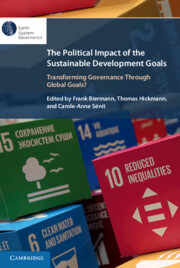When we began to conceptualize this assessment in January 2020, we were unaware of the upcoming global pandemic. Shortly thereafter, COVID-19 hit the world, with devastating consequences particularly for poorer and disadvantaged groups and regions. The outbreak of the pandemic has laid bare the system failures, inequalities and disparities of our time and made one thing clear: nobody is safe until everyone is safe. Only through global cooperation and solidarity can we fight the virus.
The year 2020 also marked the launch of the United Nations Decade of Action to secure greater leadership and cooperation to deliver the Sustainable Development Goals. These 17 global goals are the core of the 2030 Agenda for Sustainable Development that the United Nations General Assembly adopted in September 2015. The goals are meant to offer a blueprint to prevent and mitigate the adverse effects of a global crisis like the spread of COVID-19. Poverty and hunger, inadequate health systems, inequality, gender gaps, limited access to water and sanitation, and insufficient social protection: these are the major factors why the pandemic could have such disruptive global effects. All this highlights the importance of the ambitions enshrined in the 2030 Agenda and the Sustainable Development Goals. But where do we stand with the 2030 Agenda? Or more precisely, have the 17 Sustainable Developments Goals led to major political and institutional changes after their adoption in 2015?
This is the guiding question this book is set to answer. Resulting from a collaborative and inclusive writing process, this book provides a broad evaluation of the scientific knowledge on the steering effects of the Sustainable Development Goals on key governance dimensions. The book is meant for governance researchers as a comprehensive assessment of the potential and pitfalls of ‘governing through global goals’ as a steering mechanism in world politics. It shall also provide evidence-based insights for practitioners and others concerned with the governance of sustainable development. The book identifies major research gaps, and we hope that it will trigger new research in both Global North and Global South that builds on our work. As such, this work serves as a key reference for researchers and practitioners and lays a solid foundation for future studies on the Sustainable Development Goals and similar global policy initiatives.
The book has been written under COVID-19 restrictions, from a dispersed global network of home offices, and often in difficult personal circumstances. The assessment outline was first discussed in 2020 in a virtual meeting of the scientific steering group, held in conjunction with the International Research Symposium GlobalGoals2020 hosted online by Utrecht University. The meeting was followed by online discussions of the author teams responsible for the six main assessment chapters, often at late or early hours depending on the multiple time zones involved.
An assessment of this ambition is too large to be handled by one institution. The assessment has thus become a joint effort of a range of international research institutions, including the Copernicus Institute of Sustainable Development at Utrecht University, the Alex Ekwueme Federal University Ndufu Alike, the German Development Institute, the German Institute for International and Security Affairs, the Monash Sustainable Development Institute in Melbourne, the North-West University in South Africa, the Potsdam Institute for Climate Impact Research, the research and policy network Southern Voice, the Stockholm Environment Institute, the Sussex Sustainability Research Programme, and the University of Toronto. The GlobalGoals Project at Utrecht University, funded by an Advanced Grant of the European Research Council, has led the process and provided managerial and editorial support. The assessment has been endorsed and supported by the Earth System Governance Project, a global network of scholars studying governance and policy issues around transformations of planetary systems and global sustainability.
Without the commitment from all these institutions and colleagues, this assessment would not have been possible. Many thanks to all who took part in this journey. First and foremost, we wish to thank the lead and contributing authors for their dedication and commitment to this assessment and their patience during detailed rounds of revisions. We are also grateful for the insightful comments and critical remarks by three anonymous reviewers, whose feedback significantly improved the design and content of this book. Many thanks also to the supporting institutions and their funding agencies. Moreover, we are grateful for all participants of the GlobalGoals2020 conference who made that event a major success. The keynotes, paper presentations and discussions at GlobalGoals2020 spurred our planning and further motivated us to pursue this project in difficult times. Furthermore, we are indebted to Leonie Grob for her organizational talent, readiness to help and painstaking work on numerous editorial tasks, and Blake Harvey for her editorial assistance in the final production stages. Last but not least, we are thankful to the staff of Cambridge University Press, especially to Emma Kiddle and Sarah Lambert, for providing invaluable support from the first draft proposal towards production of the book, and to Matthew Seal for carefully copyediting a book written by more than sixty authors from all over the world. The key findings of this assessment have appeared in synthesized form in Nature Sustainability in May 2022.
This book is meant to be an in-depth evaluation of where the Sustainable Development Goals stand today from an academic perspective. Clearly, we are not on track to achieve these ambitious goals by 2030. More efforts are needed to bring about the necessary transformations towards sustainable development. The Sustainable Development Goals had some positive effects on actors and institutions, and the first small steps for a better world have been taken. Yet the race is still long while time is running out.



